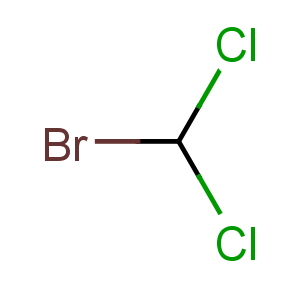Title: Bromodichloromethane
CAS Registry Number: 75-27-4
Synonyms: Dichlorobromomethane; BDCM
Manufacturers' Codes: NCI-C55243
Molecular Formula: CHBrCl2
Molecular Weight: 163.83
Percent Composition: C 7.33%, H 0.62%, Br 48.77%, Cl 43.28%
Literature References: Trihalomethane contaminant found in chlorinated water. Prepn: O. Jacobsen, R. Neumeister,
Ber. 15, 599 (1882); M. Fedorynski
et al., Synth. Commun. 7, 287 (1977). Disposition and metabolism: J. M. Mathews
et al., J. Toxicol. Environ. Health 30, 15 (1990). Toxicity studies: F. J. Bowman
et al., Toxicol. Appl. Pharmacol. 44, 213 (1978); Y. Aida
et al., J. Toxicol. Sci. 17, 51 (1992). Review of quantitative analyses, toxicity and carcinogenicity:
IARC Monographs 52, 179-212 (1991); of toxicology and human exposure:
Toxicological Profile for Bromodichloromethane (PB90-167461, 1989) 89 pp.
Properties: Colorless liquid. bp 88.4-88.6° (Fedorynski); also reported as bp 91-92° (Jacobsen). d15 1.9254.
nD20 1.4967. LD50 in male, female mice (mg/kg): 450, 900 orally (Bowman).
Boiling point: bp 88.4-88.6° (Fedorynski); bp 91-92° (Jacobsen)
Index of refraction: nD20 1.4967
Density: d15 1.9254
Toxicity data: LD50 in male, female mice (mg/kg): 450, 900 orally (Bowman)
CAUTION: Potential symptoms of acute oral overexposure in animals are liver and kidney damage; CNS depression, incoordination, sleepiness, lethargy, sedation. Chronic exposure has been associated with cancer of liver, kidney and intestines.
See: Toxicological Profile for Bromodichloromethane (PB90-167461, 1989) 77 pp. This substance is reasonably anticipated to be a human carcinogen:
Report on Carcinogens, Eleventh Edition (PB2005-104914, 2004) p III-35.
Use: Chemical reagent, intermediate in organic synthesis.

